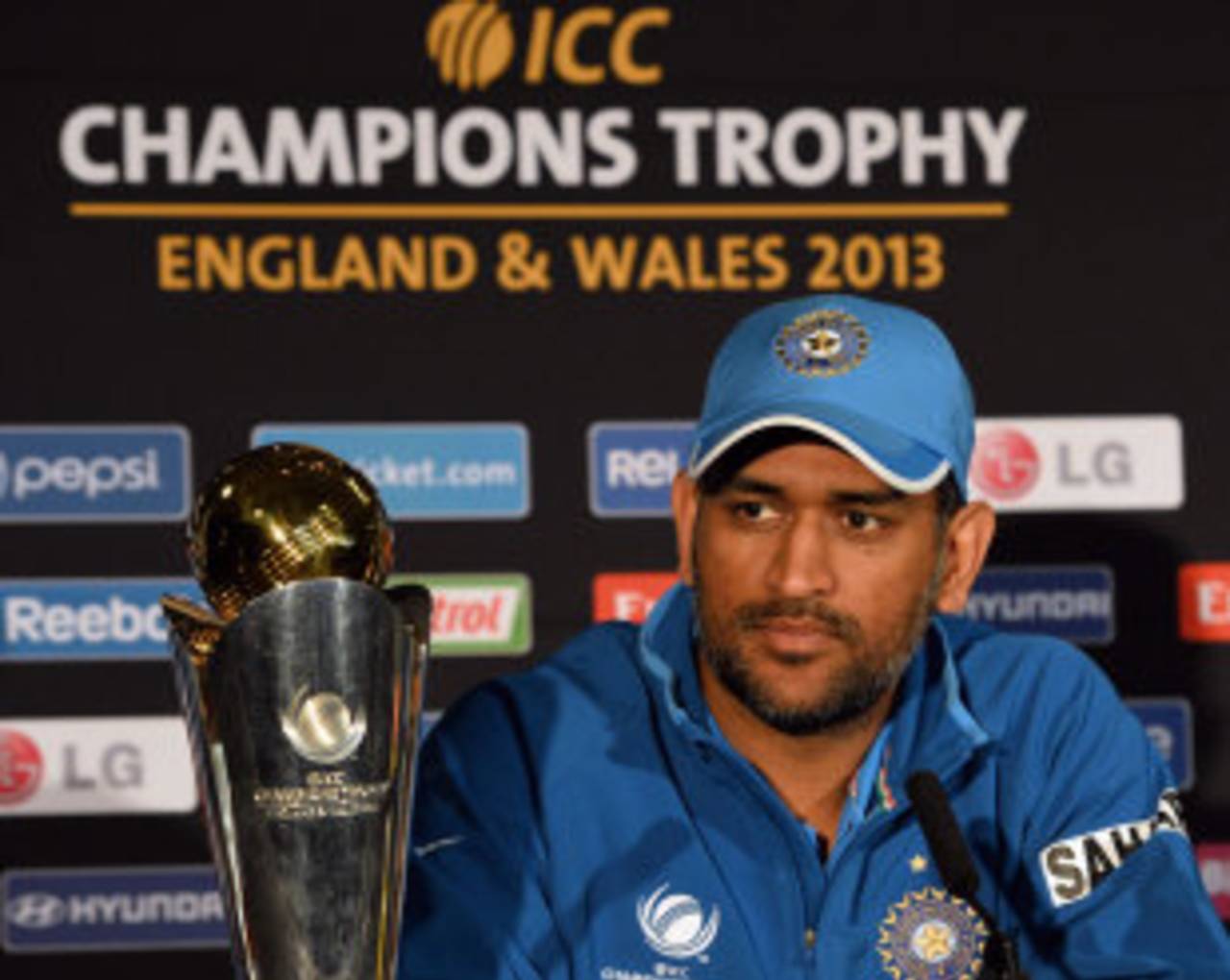MS Dhoni walked into the media conference at Edgbaston with his smart phone in hand. Leading into and out of the briefing, he was engrossed in playing a video game. He had a calm and happy demeanour throughout. It is also the image that Dhoni carries onto the field. His ability to keep a clear head at moments when the stakes are the highest is what has elevated Dhoni to being one of the best leaders in the game.
On Sunday, Dhoni will walk into his third final of an ICC event. In the previous two, India won the title - the
2007 World Twenty20 and the
2011 World Cup. On both occasions Dhoni's role was decisive. The match-winners were different in these two events, but Dhoni has remained a constant. And throughout these years he has pretty much remained the same: making his voice heard only when there has been a need, otherwise enjoying his own space, insulated by the events around him.
The one change that has become increasingly visible is that Dhoni has become more vocal in expressing his unhappiness if a player is not doing his job properly as well as more public in his appraisal if a player does anything extraordinary. In the semi-final against Sri Lanka,
Rohit Sharma, standing at point, was casual in letting go a late cut from Mahela Jayawardene. At the most it was single but the Sri Lanka batsmen ran three. Dhoni was livid at Rohit's mistake as he punched his gloved hands in disgust.
It was the same Rohit who had got a pat on his back from his captain in the group match at The Oval when, standing this time at backward point, he had thrown himself to his right to cut short a powerful square cut from Darren Bravo and deny him a certain four. Dhoni was happy to go the distance to compliment his player.
A good leader makes a good team. He also guards the team in the time of crisis. Take Australia. In the absence of Michael Clarke, they made an early exit, and were in the news for all the wrong reasons. A stable captain can lend direction to the team. Angelo Mathews could not explain why Sri Lanka continue to fail against India in the knockouts.
Obviously Dhoni is not the perfect captain, both as a strategist and especially while communicating with the media, who he has always looked at with suspicion for various reasons. Equally, his silence or reluctance to speak on important matters has created a deep chasm between him and the press. But that does not matter to Dhoni. His muted response to all queries on arrival in England, and
before departing India, about the corruption issues surrounding players and team owners in the IPL was criticised widely by all media.
But that is where Dhoni's strengths as a leader come to the fore. He is ready to absorb all criticism and shield his team from all unnecessary distractions. He does not mind people making judgements because he is not going to be answer them. At every media briefing this tournament, he has maintained that the team's goal is to improve with every match and every net session. He made it clear that Vision 2015 had not yet started. The focus, he pointed out, has been always on the present.
More than anyone else in the India team, Alastair Cook's England will single out Dhoni as the biggest threat. It does not matter that Dhoni has hardly batted this tournament. Even in the 2011 World Cup, Dhoni had gone without a fifty in the previous seven matches before the final. There,
against Sri Lanka, Dhoni promoted himself above Yuvraj Singh, the player of the World Cup, and hit a deafening 91, finishing with a walloping, iconic six.
On Saturday afternoon, minutes before Dhoni arrived for the media briefing, the British and Irish Lions had pulled off a spine-tingling victory against the Wallabies in the rugby Test series in Brisbane. Kurtley Beale suffered nerves and messed up two penalty kicks. The second one, from 46 metres, came barely 30 seconds before the final whistle. If Beale had kicked successfully, glory would have been Australia's as they would have bounced back to win the Test by a point. Instead they lost by two points as Beale slipped even before he kicked. Precarious moments. If you succeed you cross a milestone. If you fail, it becomes a millstone around your neck.
Dhoni has encountered numerous such moments in his life. One reason he has not slipped is because he can insulate himself from intense pressure. The other reason he has survived them is because he has never looked too far ahead. His message has always been to stay in the moment. A final of a world tournament is a high-pressure zone. More than anyone in the team, the captain needs to have a clear head. Dhoni has one.
